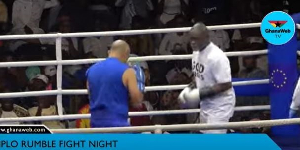- Home - News
- TWI News | TV
- Polls
- Year In Review
- News Archive
- Crime & Punishment
- Politics
- Regional
- Editorial
- Health
- Ghanaians Abroad
- Tabloid
- Africa
- Religion
- Election 2020
- Coronavirus
- News Videos | TV
- Photo Archives
- News Headlines
- Press Release
General News of Tuesday, 29 October 2002
Source: Daily Guide
GCMA Threatens "Aluta"
REGIONAL MANAGERS of the Ghana Co-operative Marketing Association (GCMA) Limited have threatened to stage a massive demonstration in Accra to back their demand for the restoration of their assets and payment of ?17 billion to them.
The managers hinted that with the support of their over 2,000 redundant workers, they would march through the ceremonial streets in Accra and present a petition to President John Agyekum Kufuor at the Castle, Osu.
At a meeting in Accra last Friday, the regional managers expressed disgust at the way and manner in which successive governments confiscated and de-confiscated assets of the association.
The managers alleged that during the erstwhile PNDC era, though the assets of GCMA and other Cocoa Buying Agencies were de-confiscated, the assets of all the buying agencies were returned to them, leaving those of the GCMA still confiscated.
“No reasons were assigned for the blatant discrimination, but we suspect that it was done, ostensibly to favour CASHPRO, whose directors were political giants in the then government”, they stressed.
They further alleged that Dr. Obed Asamoah, former Minister of Justice and Attorney-General, once remarked that “the assets of GCMA would be returned over to them, over his dead body”.
According to the regional managers, a delegation of the association at a time called on the current Minister of Justice and Attorney-General, Nana Akufo-Addo, and he assured them that the assets would be definitely returned to them, but up till now, nothing has been done.
In this particular case, the managers said they strongly suspect that “the government is being remotely controlled by the Cocobod which is in possession of all the assets of the GCMA over 30 years now”.
They complained that during the period, the Cocobod had not effected any maintenance work on the assets, which comprise buildings, vehicles, tarpaulins, scales and office equipment, among others.
Rather, the Cocobod rented the buildings to individuals and groups and, in some cases, gave some to girl friends of certain high government officials to be used for financial purposes, such as chop-bars and the like.
At Kumasi, for example, the managers alleged that one of the confiscated buildings has been rented for ?60 million to Nam Enterprise; at Sunyani, another building was rented to private individuals who are using it as a store.
At Goaso, one of the assets is being rented out and being used as an FM Station, the list goes on and on.
The irony of it all is that, while Cocobod is gaining from the use of the assets, the GCMA is paying property rate for them.
Tracing the history of the GCMA, they complained that it has suffered a lot from political interference and victimisation, leading to confiscation of its assets on several occasions.
They observed that “the political interferences and confiscation of assets happened under undemocratic and unconstitutional governments”.
They recalled that between 1947 and 1957, GCMA recorded outstanding achievements. It was then described as “one of the best indigenous organisations south of the Sahara”.
Consequently, two officers of the association were awarded the Order of the British Empire (OBE) by the British Government in recognition of their contributions to the cocoa industry.
They alleged that as a result of its success as a formidable economic force, GCMA attracted political attention.
In 1961, the CPP Government which perceived the GCMA as part of the then Opposition United Party (UP), banned the GCMA, confiscated its assets and handed them over to the United Ghana Farmers’ Council.
However, in 1966, after the overthrow of the CPP Government, the Progress Party Government returned the assets of GCMA to it.
But, they further alleged in 1980, the “Kye Committee” was appointed to go into the accounts of the Cocoa Marketing Board and a number of the erstwhile buying agencies among which was GCMA.
The committee awarded ?6 million to the association for loss of use of its assets against Cocobod.
But Cocobod was not satisfied with the ruling and, herefore, took up the matter to the High Court when GCMA attempted to collect the ?6 million awarded against it with 4 per cent interest, and ?2 million costs for GCMA against Cocobod.
Cocobod again appealed against the judgement of the High Court at the Appeal Court.
At the time that GCMA was attempting to enforce the ruling of the “Kye Committee” and that of the High Court, then came the PNDC Law 89, which confiscated the assets of the GCMA and other cocoa buying agencies to the Cocobod.










